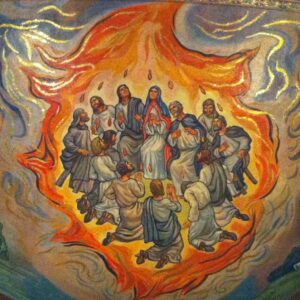 What shall we do? Two thousand years ago, men and women who had followed Jesus asked themselves this question on the first Pentecost. And we are the beneficiaries of their answer. They chose to continue to follow Him with their hearts, minds, and souls. All of us who will gather to pray, remember, and rejoice on this Pentecost are heirs of their decision on that first Pentecost.
What shall we do? Two thousand years ago, men and women who had followed Jesus asked themselves this question on the first Pentecost. And we are the beneficiaries of their answer. They chose to continue to follow Him with their hearts, minds, and souls. All of us who will gather to pray, remember, and rejoice on this Pentecost are heirs of their decision on that first Pentecost.
Those first Christians cleared the path, and often died trying, so that we might walk in their footsteps – walk The Way of Jesus – today. So today, let us dare to ask the questions which logically follow: Where will those footsteps take us? Who will be the beneficiaries of our choices? To whom will we pass the flame, the torch of faith? It is up to each of us to now decide. This Pentecost, let us ask the Spirit to touch all of our hearts, as He touched the hearts of the first disciples on the first Pentecost. May the fire of faith burn over us, so the flame can spread.
“Come, Holy Spirit, enkindle in us the fire of your love.”
A Bonus Pentecost Reflection from Fr. Ron Rolheiser:
Perhaps the single, most-often quoted line from Pope Francis is his response to a question he was asked vis à vis the morality of a particularly dicey issue. His infamous-famous reply: “Who am I to judge?” Although this remark is often assumed to be flighty and less-than-serious, it is, in fact, on pretty safe ground. Jesus, it seems, says basically the same thing. For example, in His conversation with Nicodemus in St. John’s Gospel, He, in essence, says: I judge no one.
If the Gospel of St. John is to be believed, and it is, then Jesus judges no one. God judges no one. But that needs to be put into context. It doesn’t mean that there aren’t any moral judgments and that our actions are indifferent to moral scrutiny. There is judgment—except it doesn’t work the way it is fantasized inside the popular mind. According to what Jesus tells us in St. John’s Gospel, judgment works this way: God’s light, God’s truth, and God’s Spirit come into the world. We then judge ourselves according to how we live in the face of them. God’s light has come into the world, but we can choose to live in darkness. That’s our decision, our judgment. God’s truth has been revealed, but we can choose to live in falsehood, in lies. It’s our decision, our judgment to make.
And God’s Spirit has come into the world, but we can prefer to live outside that spirit, in another spirit. That too is our decision, our judgment. God judges no one. We judge ourselves. Hence we can also say that God condemns no one, though we can choose to condemn ourselves. And God punishes no one, but we can choose to punish ourselves.
Have you ever heard this question? “If God is all-good, all-loving, and all-merciful, how can God condemn someone to hell for all eternity?” It is a valid question, though not a particularly reflective one. Why? Because God judges no one; God punishes no one. God condemns no one to hell. We do these things to ourselves: we judge ourselves, we punish ourselves, and we put ourselves in various forms of hell whenever we do choose not to live in the light, in the truth, and inside God’s Spirit. Like Pope Francis, perhaps we should be less quick to offer judgments in God’s name and more prone to say: “Who am I to judge?”

